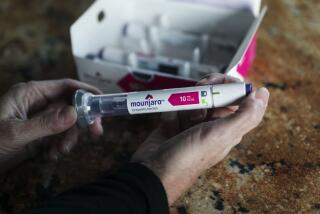2 drugs might have no benefit
- Share via
Two of the world’s bestselling drugs to lower cholesterol may have no benefit, researchers reported Sunday in a development that could significantly alter how patients are treated for heart disease. Based on the news, a top medical journal encouraged doctors to stop routinely prescribing them.
Vytorin and a related drug, Zetia, did not reduce fatty plaque in arteries any more than a cheaper generic, researchers said at a major cardiology conference in Chicago. Plaque, a buildup of cholesterol in the arteries, is believed to often play a key role in heart attacks and strokes.
In an online editorial, the New England Journal of Medicine recommended that until more research was available, patients should forgo using the drugs unless other medications such as statins or a better diet and more exercise fail to lower cholesterol levels in their blood.
Doctors said patients should not stop using the medicines without consulting their physicians. But specialists estimated that as many as two-thirds of the people currently taking the drugs may eventually be switched to other therapies.
The medicines, jointly sold by Merck & Co. and Schering-Plough Corp., were taken by more than 4 million patients in the U.S. last year and accounted for $5 billion in sales.
“What this tells us is that we have had far too many patients on these drugs than the science supports,” said Dr. W. Douglas Weaver, a cardiologist and president-elect of the American College of Cardiology. “I suspect we will see a significant decrease in prescriptions.”
The trial, known as Enhance, was finished in 2006 but the full results were not released until now. The surprisingly negative results are likely to fuel an already fevered debate over why it took so long for the drugs’ two manufacturers to release the findings.
Critics may seize on it as evidence that the pharmaceutical industry is not keeping its vow to improve how it discloses clinical trial data. Two years ago, drug companies promised to register research trials in a public database and disclose outcomes as soon as possible. But there are few penalties for not complying.
Merck and Schering-Plough released partial results in January after media reports about the delay and a proposal late last year to change the trial’s main research goal raised eyebrows. Making such a change after a trial gets underway would be highly unusual, and the proposal had some researchers worried that Merck and Schering were trying to undermine the scientific process.
The plan was scrapped after members of Congress raised questions late last year. Congress and state regulators are investigating whether the companies postponed releasing the study results to protect the profit that flows from the drugs, which Merck and Schering-Plough share equally.
Several weeks ago, Schering-Plough’s chief executive said he learned the results of the Enhance study only days before the company released them to the public in January.
Merck’s CEO said at the time he was “concerned by the extensive news coverage [of Vytorin], which has created a great deal of confusion among healthcare professionals and patients.”
In a joint statement Sunday, the firms said the drugs were effective and that they planned to continue marketing them as primary treatments for heart disease.
Dr. Sanjay Kaul, a cardiologist at the Cedars-Sinai Heart Institute, said he would review the findings released Sunday but didn’t expect to cut back on prescribing the medications because he had so few patients on them.
Still, he said, drug companies had the obligation to inform doctors about all research as quickly as possible.
“The sad fact is the scientific process was undermined here because these companies choose not to release information in a timely fashion,” he said.
Schering-Plough’s Zetia came to market in 2002 and Vytorin, which combines Zetia with an older statin, became available in 2004.
The drugs have not been shown to prevent heart attacks. The Food and Drug Administration approved the medicines on the basis that they reduced levels of LDL, or bad cholesterol. Doctors have long believed that lowering LDL slows the advance of heart disease.
In the Enhance trial, the drugs did lower cholesterol levels more than a statin but neither reduced the thickening of a neck artery in trial subjects.
Some doctors and researchers expect future studies to show that the drugs reduce heart attacks and strokes even if they do not curb the buildup of plaque on artery walls. For that reason, some physicians may keep patients on the medications, doctors said. A larger study looking at that question will be released in 2012.
The FDA recently said it was reviewing the Enhance data and could take up to six months to decide if any regulatory action is needed.
In the meantime, the controversy over how a medication with no clear evidence of health benefits came to be taken by millions of Americans is sure to continue.
The drugs are used far less in countries where they are not advertised as heavily, research shows.
A separate study in the current edition of the New England Journal of Medicine found the proportion of Zetia among cholesterol-lowering prescriptions rose from 0.2% in 2003 to 3.4% in 2006 in Canada, and from 0.1% in 2002 to 15.2% in 2006 in the U.S.
Kaul, of Cedars-Sinai, said the case may indicate that the FDA’s approval process is in need of change. He supports a recent proposal for federal regulators to require drug companies to conduct follow-up trials on newly approved drugs to prove their effectiveness in a reasonable amount of time.
“We shouldn’t need to wait five to 10 years after a drug comes on the market to discover it isn’t effective,” he said.
--






